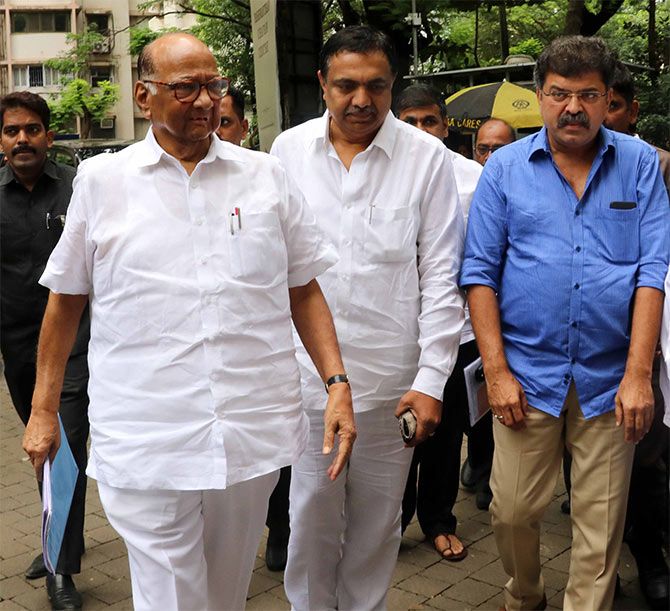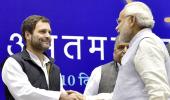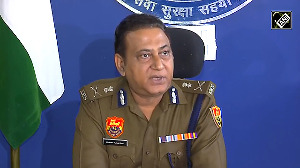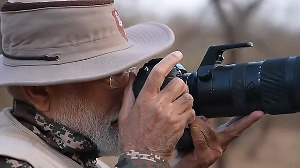'Party getting maximum seats will claim PM's post,' Sharad Pawar declared in Mumbai on Monday.
Declaring that he has no ambition of becoming prime minister, Pawar is holding Rahul Gandhi's hand, reassuring Mayawati and reaching out to Mamata Banerjee, reports Aditi Phadnis.

What can you say about a man who has never lost an election in his entire life and came close to becoming the prime minister of India at least twice?
That he must be a genius at resourcefulness, possessed of a ruthlessness of spirit and of flexible ideological persuasion?
You could be describing Sharadrao Pawar, one of Maharashtra's most beloved sons and one of India's most respected politicians, mostly accurately.
The indefatigable Pawar is back at doing what he does best: Putting like-minded people in touch with each other, creating opportunities, providing linkages and in the process, making openings where none seem to exist.
This time, he has taken the onus of starting a process to build consensus around a Constitutional amendment that will override the problem of 50 per cent reservation (as laid down by the courts) in order to provide reservation for the Marathas.
He cautions that this needs to be done without messing with reservations for scheduled castes and scheduled tribes.
In parallel, he is holding talks with top Opposition leaders to bring them together.
Declaring that he has no ambition of becoming prime minister, Pawar is holding Rahul Gandhi's hand, reassuring the Bahujan Samaj Party's Mayawati and reaching out to Trinamool Congress' Mamata Banerjee.
He has also called on M K Stalin and paid his respects to Dravida Munnetra Kazhagam leader M Karunanidhi when he passed away.
What he hasn't done is say anything that could construe as endorsement of Narendra Damodardas Modi-Amit Anilchandra Shah's politics (in fact, he reminded a votary of the Muslims-should-go-to-Pakistan theory that Pakistan was part of India once and on his many visits there, had found people of that country had great affection for people of India).
So it can be safely assumed that Pawar is batting on the side of the Opposition.
Why does this need to be spelt out in such detail?
As a section of the Congress knows, with Pawar, you never can tell.
Look at history. After playing a key role in dethroning Sitaram Kesri as Congress president and inviting Sonia Gandhi to lead the Congress, Pawar left the Congress to form the Nationalist Congress Party along with Tariq Anwar and P A Sangma. The reason?
The foreign origins of Sonia Gandhi.
But immediately after the 1999 Lok Sabha and assembly elections, Pawar had no hesitation in joining hands with the Congress to form a government in Maharashtra and become a minister in the United Progressive Alliance government in 2004, where the dominant party was the Sonia Gandhi-led Congress.
This was just one of the U-turns in his political career that earned Pawar the image of someone who couldn't be trusted at the national level.
And yet, when it comes to dealing with political rivals, Pawar has always been a Congress politician cast in the old mould -- one who does not believe in turning political rivalries into personal feuds. He has never used harsh language against his political opponents even in election rallies.
In fact, he always tried to build bridges with political opponents which is why, despite being in fierce competition for the number one slot in Maharashtra, he used to share an excellent personal rapport with Shiv Sena supremo Bal Thackeray.
What is equally undeniable is his record as an administrator.
In his constituency, farmers were encouraged to rear emu and ostrich (the meat being prized in Mumbai's five-star hotels), and grow strawberries and grape amid swaying fields of sugarcane (mushrooms were passé).
Today we recall Maharashtra's Enron experiment with shame. But it was Enron that released India from a taboo of inviting multinationals to invest in the power sector.
Because of his pro-reform convictions, he enjoyed the trust of all big corporate houses in the country. They used to look up to him as a man who could deliver.
In fact, when a feud broke out in the Bajaj family both factions accepted Pawar as arbitrator.
Pawar has seen a lot, done a lot. That is why his intervention in acting honest broker to bring the Opposition together needs to be taken seriously.
The Bharatiya Janata Party might not be quaking at the prospect, but it would do well to take note of Pawar's interventions.












 © 2025
© 2025